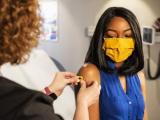Editor's note: This story was revised Sep 1 to reflect a recent change in the Infectious Diseases Society of America's position on mandatory flu vaccination for healthcare workers.
Aug 31, 2010 (CIDRAP News) – The Society for Healthcare Epidemiology of America (SHEA) today added its name to the list of medical groups calling for mandatory influenza vaccination for healthcare workers (HCWs), saying only those who have medical contraindications should be exempt.
"SHEA views influenza vaccination of HCP[healthcare personnel] as a core patient and HCP safety practice with which noncompliance should not be tolerated," the 1,800-member group of physicians, infection preventionists, and other professionals said in a lengthy position statement published online by Infection Control and Hospital Epidemiology.
To protect both patients and health workers, flu vaccination should be a requirement for both hiring and continued employment and/or professional privileges, SHEA asserts. It recommends that the requirement should apply to HCWs in all settings, regardless of whether they have direct patient contact, and to all students, volunteers, and contract workers.
The SHEA statement marks a change from its previous stance, announced in 2005, which recommended a voluntary approach to promoting flu immunization in HCWs, using education, free vaccinations, and signed declination forms.
Several hospitals and healthcare systems around the country have adopted a flu vaccination mandate since then, as noted in the statement. Also, the Infectious Diseases Society of America (IDSA) endorsed a flu-vaccine requirement for HCWs in 2009, and the US Department of Defense has had such a requirement for all health workers in military facilities since 2008.
The Association of Professionals in Infection Control and Epidemiology (APIC) also recommended a flu vaccine mandate in 2008, but with an exemption for workers who sign a form saying they understand the risk to patients if they don't get the shot.
Dr. Neil Fishman, president of SHEA, said the group's position change was prompted by a combination of increasing scientific evidence, chronic low vaccination rates, ethical concerns, and the success of vaccination mandates in a number of institutions around the country.
"The science is clear and irrefutable. The best way to prevent flu is by administration of flu vaccine," Fishman told CIDRAP News. He is director of the Department of Healthcare Epidemiology and Infection Control for the University of Pennsylvania Health System in Philadelphia.
"Additionally, despite multiple different interventions designed to improve vaccination rates, vaccination rates of healthcare providers have hovered in the 30% to 40% range nationally for decades," he said. "Those two facts, coupled with the ethical obligation that healthcare providers assume to protect their patients when we enter the field, prompted the move to the recommendation for mandatory vaccination."
"One other factor was the success in mandatory vaccination programs that we started to see around the country," he added. "There aren't many, but there are some very dramatic success stories."
As noted in the SHEA statement, Virginia Mason Medical Center in Seattle led the way by adopting a mandate in 2005. The policy has led to a 98% immunization rate for employees and adjunct personnel over the past 4 years. Similar requirements have since been embraced by BJC Healthcare, based in St. Louis, and the Hospital Corp. of America, which has 163 facilities nationwide. Fishman said his own employer also established a requirement.
SHEA does not recommend allowing exemptions for religious reasons. "It's easy to use that [religious concerns] as an all-purpose excuse," Fishman commented. (The IDSA, in calling for a vaccination mandate in 2009, recommended medical and religious exemptions, but the organization recently changed its position and now recommends only medical exemptions.)
The report says SHEA opposes religious exemptions because lack of vaccination poses "an unacceptable risk to patients" and other HCWs. It adds that courts have upheld school-entry vaccination requirements that lacked religious exemptions.
The statement says that health workers in most facilities are already required to be vaccinated against or have immunity to varicella, measles, mumps, and rubella.
"It's not as though this is an isolated requirement or mandate. It's part of policies that have been accepted for years," said Fishman.
Some organizations that require flu immunizations stipulate those who are not immunized must wear a surgical mask when caring for patients during flu season. The SHEA statement says that measure may be useful but does not specifically endorse it, saying it is "logistically challenging" and may stigmatize workers who have valid contraindications to vaccination.
Fishman said SHEA officials wanted to make sure their policy was "evidence-based." When it came to mandatory masking for unvaccinated HCWs, he said, "We didn't think the evidence base was strong enough to make that a formal recommendation."
Concerning the chance of an employee backlash against vaccination mandates, Fishman commented, "I think there's a vocal minority that have protested, but if you look around the country, very few people have actually ended up losing their jobs over the policy [where it exists]. I think generally what I've seen is the policy is well accepted."
The SHEA report discusses recent studies indicating that flu immunization in HCWs has reduced patient mortality. It says that a vaccination mandate should be part of a comprehensive infection control program and needs full support from hospital leaders.
See also:
Aug 31 SHEA news release
Full text of SHEA position paper:
Aug 3 CIDRAP News story "First hospital to mandate flu vaccination reports on challenges, success"
Jul 16 CIDRAP News story "IDSA urges mandatory flu shots for health workers"
Oct 2008 CIDRAP News story "APIC seeks mandate for flu shots in health workers"
2005 SHEA position paper on flu vaccination for HCWs



















